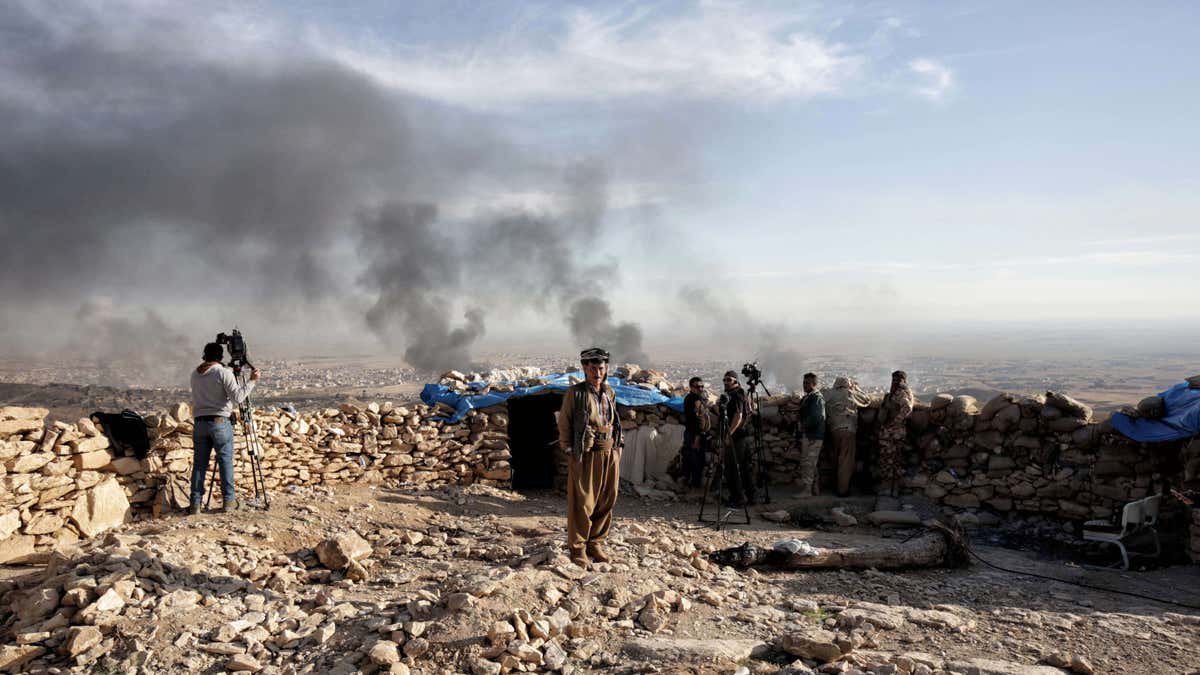
Nov. 12, 2015: Smoke rises over Sinjar, northern Iraq from oil fires set by Islamic State militants as Kurdish Iraqi fighters, backed by U.S.-led airstrikes, launch a major assault. (AP)
SINJAR, Iraq – Iraqi Kurdish militias battling to take back Sinjar from ISIS militants raised a Kurdish flag and fired off celebratory gunfire in the center of town Friday, though U.S. and Kurdish officials cautioned that it was too soon to declare victory in a major offensive to retake the strategic community.
The Kurdish forces encountered little resistance, at least initially, suggesting that many of the ISIS fighters may have pulled back in anticipation of Friday's advance. It was also possible that they could be biding their time before striking back.
Kurdish militia fighters known as Peshmerga launched a major offensive to retake Sinjar and succeeded in cutting a key nearby highway on Thursday. U.S.-led coalition airstrikes supported the offensive, dubbed Operation Free Sinjar.
Peshmerga Maj. Ghazi Ali, who oversees one of the units involved in the offensive, said thousands of Kurdish fighters entered the town from three directions Friday morning. Associated Press journalists saw them raise a flag over a building in the center of the city.
They encountered minimal resistance during Friday's push, Ali said. He described the situation in the city as still dangerous, however, and warned that it was too soon to declare victory.
Iraq's highest Shiite religious authority, Ayatollah Ali al-Sistani, praised Peshmerga fighters in his Friday sermon for their efforts to capture Sinjar from the Sunni militant group.
Col. Steven Warren, a spokesman for the U.S.-led coalition, confirmed only that Peshmerga fighters raised their flag on grain silos in the eastern part of the town. He said they had not fully retaken Sinjar.
There is reason for caution. An earlier attempt to wrest back control of the town, at the foot of Sinjar Mountain about 30 miles from the Syrian border, stalled in December. Militants have since been reinforcing their ranks.
The fight to dislodge ISIS militants from the Kurdish town of Kobani in northern Syria, meanwhile, took about four months -- despite hundreds of U.S. airstrikes in support of the Kurdish fighters.
ISIS overran Sinjar as they rampaged across Iraq in August 2014, leading to the killing, enslavement and flight of thousands of people from the minority Yazidi community. Its members follow an ancient faith that the Islamic State group considers heretical.
The U.S. later launched an air campaign against ISIS, also known as ISIL, Islamic State and, in Arabic, as Daesh.
Hundreds of pickup trucks and sport-utility vehicles carrying Kurdish fighters were seen gathering at the entrance of Sinjar earlier Friday ahead of a planned push into the town center.
Diar Namo, the 26-year-old deputy commander of the Peshmerga unit stationed there, said the skies above Sinjar were largely quiet overnight following intense coalition airstrikes on Thursday.
From his frontline observation post, he said he saw little movement inside the city before Kurdish forces moved in.
"We saw more than 50 Daesh (fighters) flee overnight," Namo said, using an Arabic acronym for the Islamic State group, "Before there were only 200 to 300 in the city."
Officials with the U.S.-led coalition estimated there were between 400 and 550 ISIS fighters inside Sinjar before the offensive began Thursday.
Southeast of Sinjar, in the village of Soulag, four Peshmerga fighters were killed when a homemade bomb targeting their truck exploded, according to fighters in their unit.
Homemade roadside bombs and explosives-laden cars targeting Peshmerga convoys significantly slowed Thursday's advance through Sinjar's eastern and western fringe.
